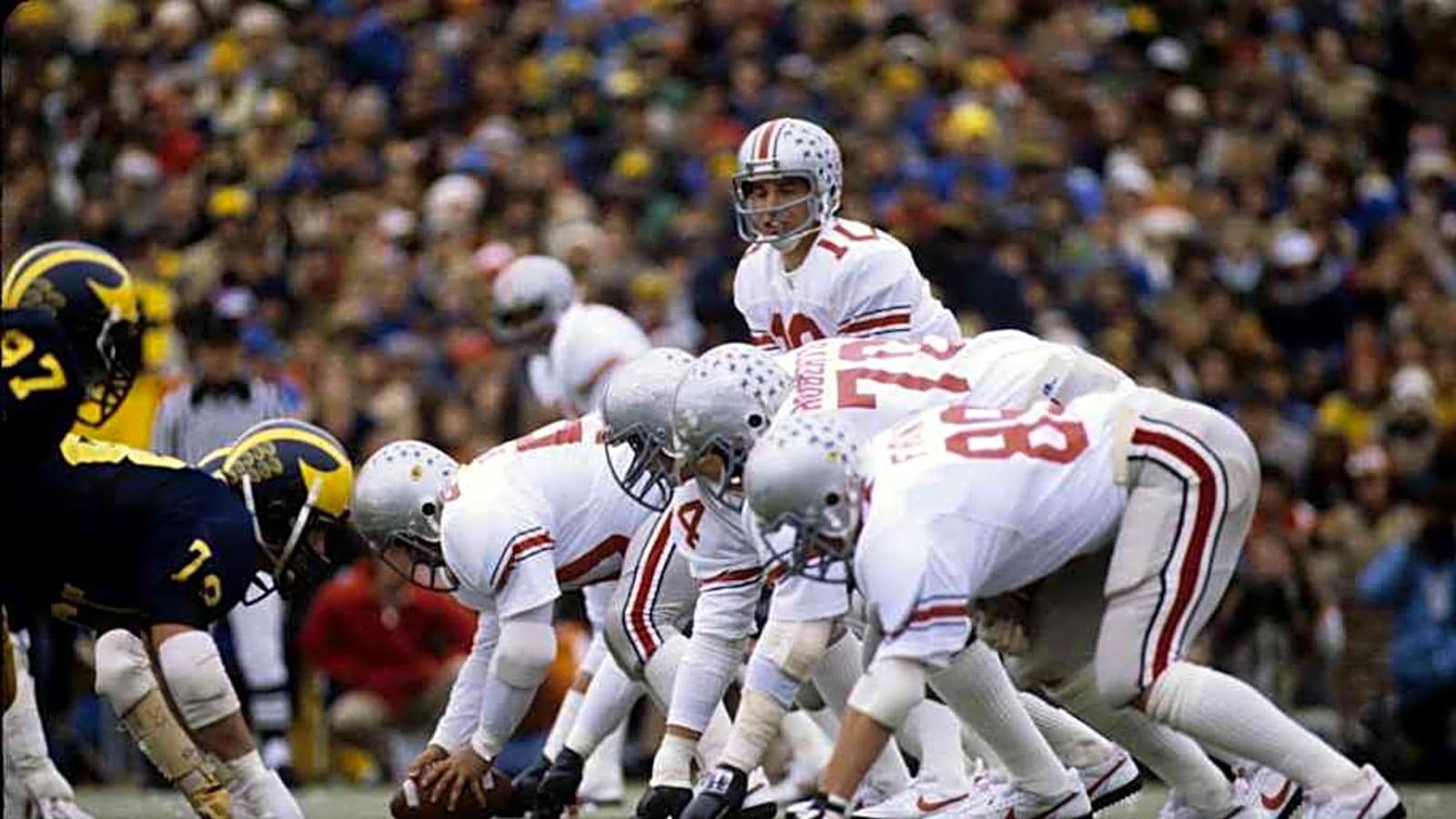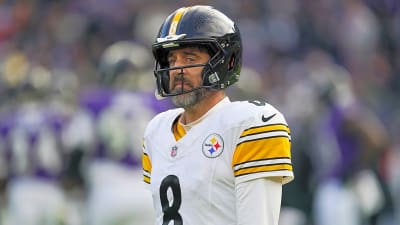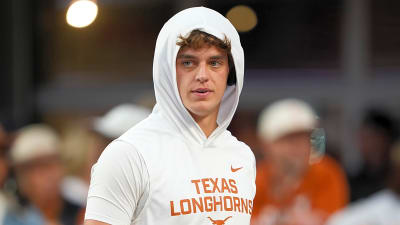
In college football, games and legacies can be decided by a matter of inches.
Throughout much of college football history, even a single loss could derail a team’s hopes for a national championship. A tipped pass, a bad call, or an unlucky ball bounce can flip a game's outcome in one-score games.
Inspired by the Nebraska Cornhuskers' historic trend of losing so many close games over the last decade, I decided to dive into college football history to see how different the sport might look if the outcome of every one-score game was flipped season by season.
Welcome to ‘What If: The 1981 Season’.
Other What If seasons: 1973, 1974, 1975, 1976, 1977, 1978, 1979, 1980
What Did Happen
The 1981 season kicked off with the top five teams in a familiar position: Michigan, Oklahoma, Notre Dame, Alabama, and USC. However, the second week brought unexpected chaos as both No. 1 Michigan and No. 2 Alabama suffered losses. The unpredictability continued as Michigan defeated the new No. 1 Notre Dame just a week later. The month ended with a thrilling No. 1 vs. No. 2 matchup, with USC securing a last-second victory over Oklahoma.
In-state rivals Penn State and Pittsburgh would enter October both in the top five, with a season finale matchup between the two teams looming. However, the No. 1 team would fall in three of the five Saturdays of October, including Penn State’s loss to Miami on Halloween. Pitt would take over the top spot entering the month of November. They would accept a bid to the Sugar Bowl to play for the national title against the SEC champion. However, Penn State would upset them in the final game of the season, knocking them out of the title hunt.
The 1981 Heisman race was a legendary matchup between two incredible running backs – Herschel Walker and Marcus Allen. Walker, who finished third as a freshman in 1980, finished the season with the third-most rushing yards in college football history. The only problem: USC’s Marcus Allen crushed Tony Dorsett’s rushing record, becoming the first player in college football history to rush for over 2000 yards in a season.
With Pitt already locked into the Sugar Bowl as the (formerly) top independent team, the Sugar Bowl had a choice between Alabama and Georgia as the SEC co-champions. Led by the spectacular Herschel Walker, and the fact that its only loss came to the unbeaten Clemson (versus Alabama’s loss to 1-9 Georgia Tech), the Bulldogs took the Sugar Bowl berth. Pitt legend Dan Marino would lead a final-minute scoring drive to spoil any Georgia claim to the title.
For the first time in 14 years, a school other than Michigan or Ohio State represented the Big 10 in Pasadena, with Iowa emerging as the surprise winner. Iowa, with a young assistant named Kirk Ferentz, had its first winning season in 20 years. Don James led Washington to its third Pac-10 crown, narrowly beating out Arizona State and USC. The Huskies would win easily, with the Hawkeyes being the only Rose Bowl participant to not score a point since Wisconsin in 1953.
An SMU suspension paved the way for Texas to play in the Cotton Bowl against the SEC co-champion Crimson Tide. Both teams were outside of title contention due to bad losses throughout the season, despite Bear Bryant becoming the sport’s all-time winningest coach. The Longhorns would make a fourth-quarter comeback to take home the Cotton Bowl crown.
The stars aligned in the same way for the Huskers as they did in 1970, with teams ranked ahead of them losing already. An Orange Bowl victory versus the Tigers would give the Huskers the crown. However, the Huskers would lose a close game in which they committed two turnovers to Clemson’s zero and accumulated more penalty yards than the Tigers.
What Almost Happened
The biggest improver in this edition of ‘What If’ is the Louisiana Ragin’ Cajuns (then known as Southwestern Louisiana). Their record improves from an abysmal 1-9-1 to a decent 6-4-1 season. Notre Dame is right behind Louisiana, improving by four wins. Dan Devine stepped down following the 1980 season. The Fighting Irish replaced their championship-winning coach with a dominant high school coach from Ohio, Gerry Faust. The Faust era gets off to a much better start in the hypothetical with Notre Dame improving by four wins to an incredible 9-2 season.
Drake, a member of the Missouri Valley Conference, had the most significant drop in 1981, going from a 10-1 season to just 4-7. Among major conference teams, Kansas and Tennessee share the title for the most significant drop in record, with each team's record decreasing by five games. This would’ve been a second straight losing season for the legendary Volunteers head coach, Johnny Majors. A 2-7 record would’ve put him on the hot seat following the season.
This ‘What If' scenario also likely changes the Heisman race. Despite Marcus Allen’s legendary season, USC is now just 6-5. While Allen would lead in every statistical category over actual runner-up Herschel Walker, it would be hard for him to win the Heisman with such a record. In this hypothetical, the Georgia legend gets his hardware a year sooner than he did in reality.
The story of the 1981 hypothetical postseason is led by a team ineligible for a bowl game due to recruiting violations – the SMU Mustangs. SMU has a perfect 11-0 record in the hypothetical, but the 1981 coaches' poll would not rank teams with a postseason ban. The AP could still award the Mustangs a title, but with four one-loss conference champions competing on New Year’s Day, the Pony Express would be left in suspense.
The biggest matchup of the 1981 hypothetical season would be the grandaddy of them all – the Rose Bowl. Michigan and UCLA would both head into the matchup with 10-1 records. The winner would have a strong case to be crowned the coaches’ poll champion with a postseason win over another one-loss team. The results of this hypothetical are anything but. The Bruins and Wolverines met in the 1981 Bluebonnet Bowl in reality. Despite the raised stakes and the de facto home game for UCLA, I still expect Schembechler’s squad to win this matchup.
With 24 teams finishing with two losses or fewer, the at-large bid picture becomes interesting. Texas A&M gets the nod in the Cotton Bowl thanks to the SMU suspension despite just a 7-4 overall record. The Aggies match up with the SEC runner-up Florida Gators. While both teams finished 7-5, the Gators were statistically much better. They would earn the Cotton Bowl crown.
In the Sugar Bowl, Notre Dame would look to improve to 5-0 all-time against Bear Bryant and his Crimson Tide. First-year coach Gerry Faust and the Fighting Irish started the season at number three. While the Irish would still suffer two blowout losses in the hypothetical, they flip four others to wins. While this was a down year for the Tide by Bear Bryant’s standards, his squad still fielded a top-20 defense in 1981. Faust’s debut season would be spoiled by the Tide’s first win against the Irish, giving Bear a strong claim for a title.
The Huskers enter the Orange Bowl as Big Eight champions and in a prime position to win a title. Dan Marino’s Panthers stand in the way as one of the best independent teams in the nation. Both teams were dominant defensively. The Huskers allowed the fewest passing yards in 1981, while Pitt allowed the fewest rushing yards. The Huskers’ two-headed rushing monster of Roger Craig and Mike Rozier was second in the nation for total rushing yards that season.
This game would have the gravity of a title bout given the resumes of these two teams. The matchup would be a close one. In reality, Nebraska bookended the season with losses to Iowa and Clemson. These teams finished fifth and seventh for rushing defense in 1981. Ultimately, the Huskers would win a close one over Marino’s Panthers.
The coaches are left with a very tough decision between Nebraska, Alabama, and Michigan. Michigan was the coaches' preseason No. 1. Despite their hypothetical loss to Navy, the coaches would crown Schembechler’s Wolverines the No. 1 team in 1981. The AP would have an even harder decision, given that SMU would also be eligible for the title. However, the AP would likely follow the same process as the coaches, giving their preseason No. 1 the championship, as well as making Michigan a unanimous champion among a great list of contenders.
For the second time in this series, Bo Schembechler and Michigan win the title that always evaded them. This Michigan team was not as good as the 1976 team that won the ‘What If’ title, but just a few games separated them from being an actual title contender in 1981. Alabama, Michigan, and Nebraska all had great opportunities to win a title if they could’ve just won one more game.
More from Nebraska on SI
- Dave Feit’s Greatest Huskers by the Numbers: 89 – Broderick Thomas
- Nebraska Baseball Drops NCAA Regional Opener to Oklahoma, 7-4Husker Football Coach Matt Rhule Discusses Year Three, Dylan Raiola
- Amy Williams Shakes Up Nebraska Women's Basketball Coaching Staff
- Nebrasketball Reveals Nonconference Slate for 2025-26 Season
More must-reads:
- New details emerge regarding Sherrone Moore situation, charges
- Utah announces big news about Kyle Whittingham
- The 'Active NBA PPG leaders' quiz
Breaking News
Trending News
Customize Your Newsletter
 +
+
Get the latest news and rumors, customized to your favorite sports and teams. Emailed daily. Always free!








